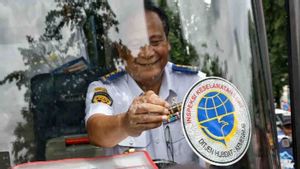JAKARTA - Bethlehem is now struggling to live again on time, namely during the Eid Al-Fitr holidays. For nearly three months, the city became the first city in the West Bank to close down due to the outbreak of the new corona virus or COVID-19.
The city came to life after the Palestinian Authority relaxed restrictions on activities in several cities, including Bethlehem. The easing was also carried out as an effort to prepare for and welcome Eid al-Fitr, which is celebrated on Saturday 23 May or Sunday 24 May in Palestine.
Several cities that were less affected by COVID-19 were allowed to open shops, businesses and banks. But to limit the mass gatherings that usually take place during the Eid holidays, Palestinian authorities said that during the three days of the Eid holiday, the closures would resume in the West Bank.
Of course this rule confuses many people. Many residents have just felt the festivities ahead of Eid al-Fitr but again face that their areas will be closing down again. The closure is expected to make people celebrate Eid in an unusual way. No more Eid al-Fitr which is synonymous with holding family gatherings, wearing new clothes, and having picnics in the park.
"People want to celebrate despite the coona virus, regardless of the situation, and despite suffering. I believe this situation is very dangerous," said Bethlehem resident Khaled Abdel-Moati.
The Palestinian Authority has recorded 388 cases of COVID-19 and two of them died. But some people believe that this figure is overreacting and causing economic problems.
"The shops are open, but there are no people in them," said Yasser Jawariesh, from the town of Beit Jala.
Meanwhile in Gaza, where there have not been any confirmed cases of COVID-19 outside the quarantine center, Hamas officials said a full lockdown was not needed yet. People flocked to markets and shops, only a few of them wearing masks.
Opening of the mosqueThe Al Aqsa Mosque in Jerusalem is known to be reopening to worshipers after the Eid holidays. Masji reopens after two months of being closed due to the COVID-19 pandemic.
"The council decided to lift the suspension of worshipers entering the Al Aqsa Mosque after the Eid holidays," in a statement released on Tuesday 19 May by the Islamic Waqf of Jerusalem.
The Al Aqsa Mosque, Islam's third holiest site, was closed in March for the first time in more than 50 years as part of measures around the world to curb the spread of the new coronavirus.
The mosque's director, Omar al-Kiswani, said he hoped there was no limit to the number of worshipers. He also added that the government body will announce the mechanisms and measures that will be put in place to prevent transmission of the virus.
Meanwhile, other mosques in the West Bank and Gaza have reopened gradually starting May 22.
The English, Chinese, Japanese, Arabic, and French versions are automatically generated by the AI. So there may still be inaccuracies in translating, please always see Indonesian as our main language. (system supported by DigitalSiber.id)








